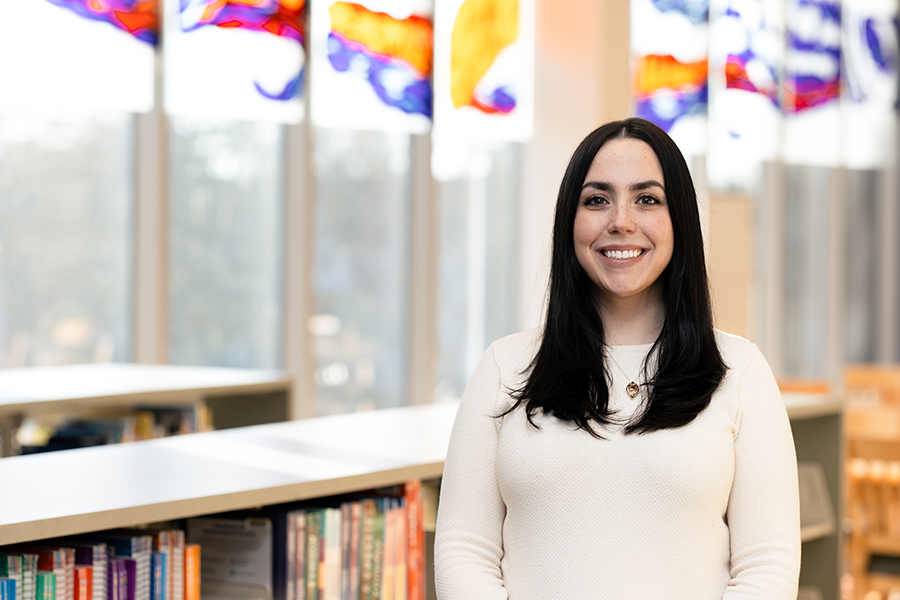TYPE
After graduating from UW-Superior, Emily Mack continued her educational journey
For many young people, selecting a career path can be positively overwhelming. How can an 18-year-old possibly know what they want to do … for the rest of their lives?
One way to avoid this “analysis paralysis” is for students to select a field that prepares them for a variety of different professions. One such choice is social work.
University of Wisconsin-Superior graduate Emily Mack, who earned a social work degree in 2017, continued her education with a master’s degree in the field, as well.
Initially, Mack struggled to choose a profession. Today, as a psychotherapist, she has found her stride. But if she ever wants a change, her degree in social work gives her plenty of options to pivot – however she sees fit – down the road.
First-Generation Hometown Student
Mack, originally from Superior, is a first-generation college student. Her late mother worked in city finance and her dad was in the screen-printing business. While hard-working, her family was of modest means.
“For a long time, I didn’t think college was an option for me, due to finances,” she shared. “Thankfully, there were a lot of scholarships available. I received a couple from UWS, along with some Pell Grants. And my dad is a veteran, so I earned some scholarship money from veterans’ associations, too.”
When choosing a career path, Mack looked to her past experiences; many of which were quite painful.
“For me, I grew up with parents who maybe weren’t in the best spot, which really made me want to help others,” she said. “My dad had severe PTSD, and later struggled with alcohol. My brother was in the pediatric ICU for a long time and needed additional attention. I also experienced sexual assault and later received professional help.”
As a trauma survivor, Mack relates deeply to many of the clients she sees in her work as a psychotherapist. Splitting her time several ways, Mack works at Superior’s Encouragement Clinic where she also sees clients in school settings. She also works at Minnesota Adult & Teen Challenge and volunteers at the Douglas County Jail.
“You have to be prepared for anything,” Mack said. “UWS’ social work program taught me things like advocacy and resource connection and looking at people as a whole. It set me up well.”
Career Versatility
Mandy Lilly is a social work professor at UW-Superior. She regularly sees social work majors explore many professions after graduation.
“This is one of the most wonderful things about social work – there seems to be an endless variety and opportunity for students to use their degree,” Lilly said. “The settings for social workers continue to expand, and we have now seen graduates enter the field working at the local public library, embedded in the police department, running for public office and in high-level advocacy work. Students who go on to pursue a master’s degree often work as therapists or have a clinical practice as well as take on leadership roles in the community.”
Program Efficiency
Another aspect of UW-Superior’s social work program is the rapidity with which students can further their education with a master’s degree.
“Students graduating from our program also benefit from the ability to advance their degree and education through Advanced Standing,” Lilly said. “This is a process where students who possess a bachelor’s degree in social work are able to complete a master’s in social work (MSW) program in only one year.”
While many believe that you must attend the same school to earn both their BS and MS degrees to get advanced standing in the graduate program, that is not the case. Students who get a BS in social work at any accredited university or college qualify for advanced standing in any graduate MSW program.
Instructor Support
UW-Superior’s social work program has a reputation for its outstanding instructors and curriculum. “The social work program at UWS prides itself on our ability to build relationships, a needed skill for future social workers,” Lilly said. “Small class sizes and faculty-to-student ratios allow for meaningful connections between students and their instructors.
“In addition, we foster a community by structuring our program on a cohort model, meaning our students come to campus in-person one day a week, and move through the subsequent semesters with the same group of people. This offers opportunities for lifelong connections, mutual support and the convenience of a one-day a week commute.”
“I would definitely recommend UWS’ social work program,” Mack said. “The smaller class sizes mean instructors are very attentive, and you get one-on-one attention. And, when I was a student, I had some intense ‘life stuff’ happening, and I received total support and accommodation.”
Growing Field
Social work is a growing field, with many job opportunities available.
“Communities are struggling with post-COVID effects that are unexpected consequences of a global pandemic,” Lilly said. “This includes sky-high mental health needs, social isolation, economic fallout, climate and environmental anxiety, and existential suffering. Underlying all of this is a major shortage of skilled people to address these complex issues.”
“We’re in a provider shortage right now, and careers in therapy are in very high demand,” Mack said.
